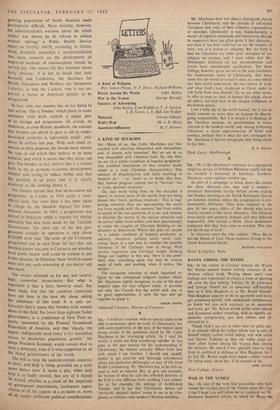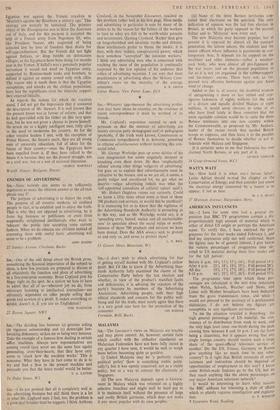WAR IN THE YEMEN
SIR,—As one of the very few journalists who have visited the royalist part of the Yemen since the coup d'etat I hope you will allow me to comment on Mr. Desmond Stewart's article, in which he Ifk.ens the
Egyptian war against the Yemeni royalists to `Mazzini's against the Bourbons a century ago.' This analogy can scarcely be sustained. The primary object of the Risorgimento was to drive the Austrians out of Italy, and for this purpose it accepted the help of a French army from Napoleon III, who, like President Nasser, wts suspected of being actuated less by love of freedom than desire for self-aggrandisement. But the French did not fight against Italians, or drop bombs on defenceless villages, as the Egyptians have been doing for months past in the Yemen. If Sallal's was a genuinely popular movement it would not need an Egyptian army, supported by Russian-made tanks and bombers, to defend it against an enemy armed only with rifles. The reason why it needs them is that the Egyptian occupation, and attacks on the civilian population, have lost the republicans even the minority ,support they enjoyed initially.
As regards the system for which the royalists stand, I did not get the impression that it answered the description of Mr. Stewart. It is well known that the present Imam was in favour of reform, and that he had quarrelled with his father on this very ques- tion, but he was not given a chance to prove himself. He struck me as a highly intelligent man, fully alive to the need to modernise his country. As for the other royalist leaders I met, with the exception of Prince Hassan, the Imam's uncle, they are all young men of university education, full of ideas for the future of their country—once the Egyptians have been expelled from it. If they have rallied to the Imam it is because they see the present struggle, not as a civil war, but as a war of national liberation.



































 Previous page
Previous page